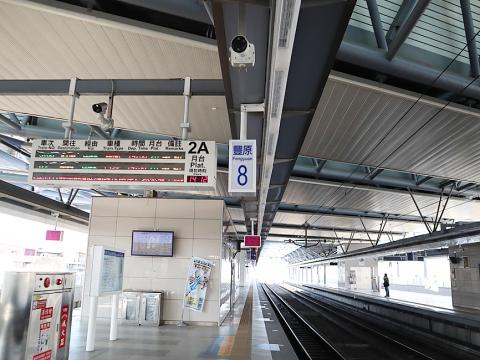The Taiwan Railways Administration (TRA) yesterday said that it would not activate the facial-recognition feature of its new smart surveillance system after lawmakers voiced their concerns over privacy issues.
The railway operator on Tuesday announced that it would soon start testing a smart surveillance system at Fengyuan Railway Station in Taichung.
The company said that the system would be mainly used to ensure the safety of passengers in and around railway stations — including detecting any intrusion onto the railway tracks and other restricted areas, abnormal loitering of individuals on the platforms or inside buildings, and suspicious packages — but lawmakers raised concerns that the facial-recognition technology would infringe on people’s privacy.

Photo: Ou Su-mei, Taipei Times
Chinese Nationalist Party (KMT) Legislator Ko Chih-en (柯志恩) said that the Democratic Progressive Party (DPP) administration has been critical of China for abusing human rights through the use of facial-recognition systems.
Ko asked if the administration of President Tsai Ing-wen (蔡英文) had learned from China by installing the technology to control the public.
DPP legislators sparked controversy in 2017 when they proposed a change to the Household Registration Act (戶籍法) that would legalize the use of iris-recognition systems by offices, Ko said.
The KMT caucus would have strongly opposed the use of facial-recognition technology if the TRA did not acceptably define the conditions under which the technology would be used, Ko said, adding that she was glad that it had decided not to activate the functionality.
KMT Legislator Jason Hsu (許毓仁) said that the Hollywood movie Enemy of the State shows how a government could control people through the mass collection of data and monitoring their whereabouts using surveillance devices.
“China has used surveillance devices to enforce a social credit rating system, while Hong Kong uses the devices to monitor pro-democracy protesters. Is it not strange that what DPP is planning to do is also what China is doing?” Hsu said.
Constitutional interpretations by the Council of Grand Justices have determined that the police cannot stop and frisk individuals without a legitimate reason, and that people have the right not to be monitored in public places, Hsu said.
However, the facial-recognition technology would enable the government to monitor people closely, like “watching goldfish in a transparent fish tank,” he said.
Following the criticism, the Taiwan Railways Administration said that it would not activate the facial-recognition technology, nor would the Railway Police Bureau.
“We will continue to build an environment that is friendly to all railway passengers while ensuring the safety of the transportation system,” the company said.

The US government has signed defense cooperation agreements with Japan and the Philippines to boost the deterrence capabilities of countries in the first island chain, a report by the National Security Bureau (NSB) showed. The main countries on the first island chain include the two nations and Taiwan. The bureau is to present the report at a meeting of the legislature’s Foreign Affairs and National Defense Committee tomorrow. The US military has deployed Typhon missile systems to Japan’s Yamaguchi Prefecture and Zambales province in the Philippines during their joint military exercises. It has also installed NMESIS anti-ship systems in Japan’s Okinawa

TRAGEDY STRIKES TAIPEI: The suspect died after falling off a building after he threw smoke grenades into Taipei Main Station and went on a killing spree in Zhongshan A 27-year-old suspect allegedly threw smoke grenades in Taipei Main Station and then proceeded to Zhongshan MRT Station in a random killing spree that resulted in the death of the suspect and two other civilians, and seven injured, including one in critical condition, as of press time last night. The suspect, identified as a man surnamed Chang Wen (張文), allegedly began the attack at Taipei Main Station, the Taipei Fire Department said, adding that it received a report at 5:24pm that smoke grenades had been thrown in the station. One man in his 50s was rushed to hospital after a cardiac arrest

‘WIN-WIN’: The Philippines, and central and eastern European countries are important potential drone cooperation partners, Minister of Foreign Affairs Lin Chia-lung said Minister of Foreign Affairs Lin Chia-lung (林佳龍) in an interview published yesterday confirmed that there are joint ventures between Taiwan and Poland in the drone industry. Lin made the remark in an exclusive interview with the Chinese-language Liberty Times (the Taipei Times’ sister paper). The government-backed Taiwan Excellence Drone International Business Opportunities Alliance and the Polish Chamber of Unmanned Systems on Wednesday last week signed a memorandum of understanding in Poland to develop a “non-China” supply chain for drones and work together on key technologies. Asked if Taiwan prioritized Poland among central and eastern European countries in drone collaboration, Lin

ON ALERT: Taiwan’s partners would issue warnings if China attempted to use Interpol to target Taiwanese, and the global body has mechanisms to prevent it, an official said China has stationed two to four people specializing in Taiwan affairs at its embassies in several democratic countries to monitor and harass Taiwanese, actions that the host nations would not tolerate, National Security Bureau (NSB) Director-General Tsai Ming-yen (蔡明彥) said yesterday. Tsai made the comments at a meeting of the legislature’s Foreign Affairs and National Defense Committee, which asked him and Minister of National Defense Wellington Koo (顧立雄) to report on potential conflicts in the Taiwan Strait and military preparedness. Democratic Progressive Party (DPP) Legislator Michelle Lin (林楚茵) expressed concern that Beijing has posted personnel from China’s Taiwan Affairs Office to its